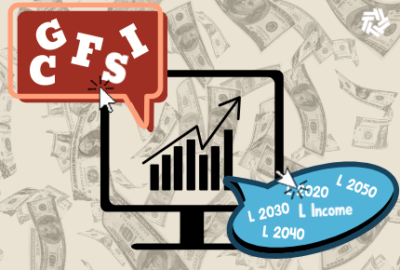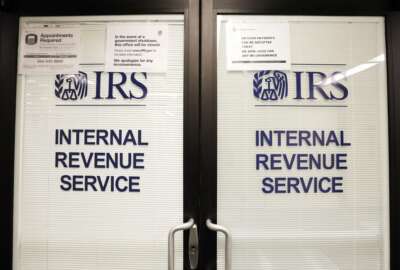
COVID-19’s impact on your TSP and taxes
In addition to upending virtually all aspects of our personal lives — health, safety, socialization — the coronavirus and reaction to it have forced millions...
In addition to upending virtually all aspects of our personal lives — health, safety, socialization — the coronavirus and reaction to it have forced millions of people to rethink plans for the future. Including considering whether there is a future.
A lot of people, including very young, healthy, relatively inexperienced people are suddenly going through mid-life crises. Things that were not due to pop up on our personal/financial radar screens for years — maybe decades — are suddenly right out front.
Millions of people who, just a couple of months ago, had good paying jobs, health insurance and vacation plans are now having to make choices between food and rent. Others are still waiting for special checks from the government. A lot of people are trying to figure out what Congress and the White House have done to ease their pain. And what’s next?
Tax deadlines were changed so you can delay filing until mid-July. Rules governing things like Required Minimum Distributions for older investors have been waived. Law offices are suddenly swamped with questions and requests from people wondering what they should be doing to make sure, in a worst case scenario, their designated loved ones get what’s due them. A will, witnessed by your buddies on the softball team that you pulled off the internet suddenly doesn’t seem sufficient. Maybe for a good reason?
So Tom O’Rourke, estate and tax attorney in the Washington, D.C., area, will be joining me this morning on our Your Turn radio show. We’ll talk about the latest in death, taxes, estates and new legislation designed to help people in these very uncertain times. The show airs live at 10 a.m. EDT on www.federalnewsnetwork.com or 1500 AM in the Washington area.
Tom will be taking questions so please send them to me before showtime at mcausey@federalnewsnetwork.com But even without them, there is a lot of ground to cover and a lot of new information, and changes you should be aware of. For instance, changes in Section 529 (tax favored educational savings plans) that may benefit you and your children. Also new age deadlines for when one must take a required minimum distribution from the Thrift Savings Plan or other 401(k) plans. He’s also going to be talking about “stretch IRAs,” which could save beneficiaries tens of thousands of dollars.
I asked Tom if he’d highlight some of the material he will be covering. Ever thorough, here’s what he sent:
“Two significant developments in the field of taxation that may affect your listeners have been enacted in recent months. These are the SECURE Act and the CARES Act. The IRS has also taken certain administrative steps to make it easier to satisfy your tax obligation.
“In late December, the president signed the Setting Every Community Up for Retirement Enhancement (Secure) Act. The SECURE Act included two significant provisions that could affect TSP participants. It extended the date on which a retiree must begin to take required minimum distributions from age 70 ½ to age 72 for persons who attained the age of 70 ½ after Dec. 31, 2019.
“A more significant change required by the SECURE Act was the elimination of the ability to take advantage of what is commonly referred to as ‘stretch IRA.’ The use of a stretch IRA allowed the beneficiary of funds in a tax deferred account to allow these funds to grow tax deferred over a long period of time. Prior to the passage of the SECURE Act, the beneficiary of a deceased TSP participant was permitted to establish an inherited IRA and withdraw funds from the inherited IRA over his/her life expectancy. If the beneficiary was a child (or a trust for the benefit of a child), this could allowed tax deferral for up to 50 years or more.
“The SECURE Act requires funds inherited from a tax deferred account to be withdrawn from the deceased individual’s account within 10 years of the date of the account owner’s death. Stretch IRAs played an important role in the estate plans of many individuals who have TSP accounts. As a result of this change, it would be advisable to review your estate plan to determine the effect of the SECURE Act on your estate plan. This is especially true if you have a TSP account balance or if you have significant funds in other tax deferred accounts.
“The SECURE Act also included a provision that could prove to be a benefit for individuals who hold Section 529 plans (tax-favored educational savings plan). The new provision allows funds in a Section 529 plan to be used to pay student loan indebtedness of up to $10,000.
“The Coronavirus Aid, Relief, and Economic Security (CARES) Act was signed into law on March 27, and was passed in response to the current coronavirus pandemic. The CARES Act is comprehensive legislation that included a number of tax provisions affecting individuals.
“One of the most widely publicized provisions of the CARES Act is its authorization of rebates to be paid to individuals who have adjusted gross income (AGI) of $75,000 or less. The amount of the rebate will be phased out completely for individuals who have AGI of more than $99,000. Married taxpayers who have AGI of $150,000 or less qualify for a rebate of $2,400 per couple. The amount of the rebate phases out for a couple with AGI of more than $198,000. In addition, a rebate of $500 for each qualifying child (i.e. a dependent who is age 17 or younger). Many of these rebate shave already been paid.
“The CARES Act also makes it easier to access fund[s] in a tax-deferred account such as an IRA, the TSP, or a 401(k) plan. As a general rule, withdrawals for a tax-deferred plan prior to age 59 ½ are subject to a 10% penalty. The CARES Act waives the 10% penalty for persons adversely impacted by the coronavirus. The maximum amount that may be withdrawn is $100,000. This amount may be repaid to the account from which it was withdrawn within three years. Any tax payable on the withdrawn amount may be spread over three years (2020, 2021, and 2022).
“Finally, the CARES Act suspends the obligation to take a required minimum distribution for person otherwise required to take such a distribution for 2020.
“In addition to these legislative changes, the IRS has taken a number of administrative steps that may impact a person’s tax liability. First, it extended the filing and tax payment deadline from April 15, 2020, until July 15, 2020. It also extended the deadline for making contributions to an IRA or HAS from April 15 until July 15. Finally persons who are dealing with the IRS on a variety of ongoing matters — audits, installment payment obligations — have also been granted extensions of time.”
If you can’t listen live, the show will be archived on our web page so you, a friend or coworker, can catch it anytime that is convenient.
Nearly Useless Factoid
By Amelia Brust
In 1920, when Prohibition took effect in the U.S. Milwaukee-based Pabst Brewing Company, makers of PBR, pivoted to cheese-making instead. They called it Pabst-ett, marketing this and their other dairy products as “digestible” and made from “pure Holstein milk from our tuberculosis-free herd.”
Source: Atlas Obscura
Copyright © 2025 Federal News Network. All rights reserved. This website is not intended for users located within the European Economic Area.
Mike Causey is senior correspondent for Federal News Network and writes his daily Federal Report column on federal employees’ pay, benefits and retirement.
Follow @mcauseyWFED





